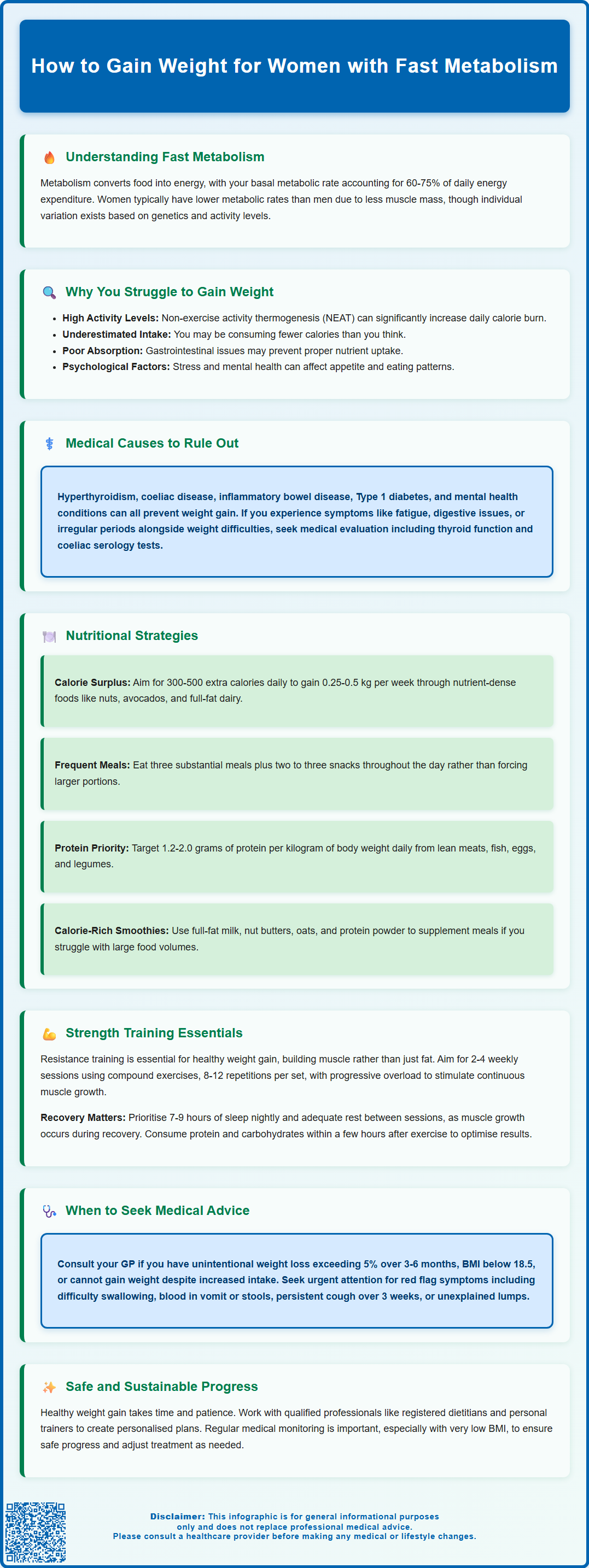Many women find gaining weight challenging, particularly those who believe they have a fast metabolism. Whilst metabolic rate does vary between individuals due to genetics, body composition, and hormonal factors, difficulty gaining weight often involves multiple contributing elements including activity levels, inadequate caloric intake, or underlying medical conditions. Achieving healthy weight gain requires a sustained energy surplus through nutrient-dense foods, combined with resistance training to promote muscle development rather than excessive fat accumulation. Understanding the true causes of weight maintenance difficulties and implementing evidence-based strategies—with medical guidance when appropriate—supports safe, effective weight gain whilst optimising overall health and wellbeing.
Summary: Women with fast metabolism can gain weight healthily by creating a sustained caloric surplus of 300–500 calories daily through nutrient-dense foods, combined with progressive resistance training to build muscle rather than fat alone.
- True hypermetabolism is uncommon; difficulty gaining weight often relates to high activity levels, inadequate intake, or underlying medical conditions requiring exclusion.
- Thyroid disorders, coeliac disease, inflammatory bowel disease, and type 1 diabetes are important medical causes that should be investigated through appropriate blood tests.
- Calorie-dense, nutritious foods including nuts, avocados, full-fat dairy, oily fish, and whole grains support healthy weight gain when consumed across three meals plus two to three snacks daily.
- Resistance training 2–4 times weekly with compound exercises promotes muscle development, requiring adequate protein intake of 1.2–2.0 g per kilogram body weight daily.
- Medical evaluation is essential for unintentional weight loss exceeding 5% over 3–6 months, BMI below 18.5 kg/m², or accompanying symptoms such as fatigue or menstrual irregularities.
Table of Contents
Understanding Fast Metabolism and Weight Gain in Women
Metabolism refers to the complex biochemical processes by which the body converts food into energy and maintains essential functions. Women who describe having a 'fast metabolism' typically experience difficulty gaining weight despite adequate or even increased caloric intake. Whilst metabolic rate does vary between individuals due to genetic factors, body composition, and hormonal influences, true hypermetabolism is relatively uncommon and often has an underlying medical cause.
Basal metabolic rate (BMR) accounts for approximately 60–75% of total daily energy expenditure and is influenced by several factors including age, height, lean muscle mass, and thyroid function. Women generally have lower metabolic rates than men due to differences in body composition, with less lean muscle mass and higher body fat percentages. However, individual variation exists, and some women do naturally have higher total daily energy expenditure due to genetics, body composition and activity levels.
It is important to distinguish between a genuinely elevated metabolic rate and other factors that may contribute to difficulty gaining weight. These include:
-
High levels of physical activity – both structured exercise and non-exercise activity thermogenesis (NEAT)
-
Inadequate caloric intake – often underestimated when self-reported
-
Poor nutrient absorption – related to gastrointestinal conditions
-
Psychological factors – stress, anxiety, or eating disorders affecting appetite
A sustained energy surplus (consuming more calories than you expend) is required for weight gain. High levels of NEAT can significantly offset increased intake, making weight gain challenging despite eating more. Understanding the true cause of weight maintenance difficulties is essential before implementing strategies for healthy weight gain. A comprehensive assessment, including dietary analysis and medical evaluation, provides the foundation for an effective, individualised approach to achieving a healthy body weight whilst supporting overall wellbeing.
Medical Causes of Difficulty Gaining Weight
Several medical conditions can contribute to unintentional weight loss or difficulty gaining weight in women, and these should be excluded before attributing weight concerns solely to metabolic rate. Hyperthyroidism is one of the most common endocrine causes, where excessive thyroid hormone production accelerates metabolism, increases heart rate, and promotes weight loss despite normal or increased appetite. Women are significantly more likely than men to develop thyroid disorders, with symptoms including heat intolerance, tremor, anxiety, and menstrual irregularities.
Gastrointestinal conditions affecting nutrient absorption represent another important category. Coeliac disease, an autoimmune condition triggered by gluten ingestion, damages the small intestinal lining and impairs absorption of essential nutrients. It's important to note that testing for coeliac disease requires adequate gluten consumption before blood tests (tTG-IgA with total IgA). Inflammatory bowel diseases (Crohn's disease and ulcerative colitis) can similarly affect nutritional status through malabsorption, increased metabolic demands, and reduced appetite. Other conditions include chronic pancreatitis, which impairs fat digestion, and small intestinal bacterial overgrowth (SIBO), which is typically considered after more common causes are excluded.
Type 1 diabetes, particularly when poorly controlled, can cause weight loss due to insulin deficiency preventing glucose uptake by cells, leading to muscle and fat breakdown. Mental health conditions, including depression, anxiety disorders, and eating disorders such as anorexia nervosa, significantly impact appetite, eating behaviours, and weight maintenance.
Chronic infections (such as tuberculosis or HIV), malignancies, and certain medications (including stimulants, some antidepressants, and chemotherapy agents) may also contribute to weight loss or difficulty gaining weight. Adrenal insufficiency, though less common, can also cause weight loss and fatigue.
When difficulty gaining weight is accompanied by other symptoms—such as fatigue, digestive disturbances, changes in bowel habits, excessive thirst, palpitations, or mood changes—medical evaluation is essential. Initial investigations typically include full blood count, thyroid function tests (TSH and free T4), coeliac serology, kidney and liver function tests, blood glucose or HbA1c, ferritin, vitamin B12/folate, and inflammatory markers (CRP/ESR). If gastrointestinal symptoms persist, stool tests such as calprotectin may be considered. These tests help identify treatable underlying causes.

Nutritional Strategies to Increase Healthy Weight
Achieving healthy weight gain requires a sustained caloric surplus—consuming more energy than the body expends—whilst prioritising nutrient-dense foods that support overall health rather than simply increasing intake of energy-dense, nutritionally poor options. For women with higher metabolic rates or increased energy expenditure, this typically means consuming 300–500 additional calories daily above maintenance requirements, which should result in a gradual weight gain of approximately 0.25–0.5 kg per week.
Increasing meal frequency is often more practical than dramatically enlarging portion sizes. Aim for three substantial meals plus two to three snacks throughout the day. This approach prevents excessive fullness whilst ensuring consistent energy intake. Focus on calorie-dense, nutritious foods including:
-
Nuts, seeds, and nut butters – excellent sources of healthy fats, protein, and calories
-
Avocados – rich in monounsaturated fats and various micronutrients
-
Full-fat dairy products – milk, yoghurt, cheese providing protein, calcium, and calories
-
Oily fish – salmon, mackerel, sardines offering omega-3 fatty acids and protein (aim for at least 2 portions of fish weekly including 1 oily; women who are pregnant, planning pregnancy or breastfeeding should limit oily fish to 2 portions weekly)
-
Whole grains – oats, wholemeal bread, brown rice, quinoa for sustained energy
-
Dried fruits – concentrated sources of calories, fibre, and minerals
-
Olive oil and other healthy fats – easily added to meals for additional calories
Protein intake is important for healthy weight gain, supporting muscle development rather than excessive fat accumulation. Women should aim for approximately 1.2–2.0 g of protein per kilogram of body weight daily (with the upper end for those undertaking structured resistance training), distributed across meals. Good sources include lean meats, poultry, fish, eggs, legumes, and dairy products. People with kidney disease should seek medical or dietetic advice before increasing protein intake.
Liquid calories can be valuable for those who struggle with large meal volumes. Smoothies made with full-fat milk or fortified plant-based alternatives (containing calcium, iodine and vitamin B12), nut butters, oats, banana, and protein powder provide substantial nutrition in an easily consumed form. However, avoid displacing solid meals entirely, as whole foods provide important nutrients and satiety signals.
For individuals with very low BMI or prolonged poor nutritional intake, there is a risk of refeeding syndrome when increasing intake. Medical supervision is recommended in these cases.
Consider working with a registered dietitian who can provide personalised guidance, calculate specific caloric requirements, and develop a structured meal plan tailored to individual preferences, lifestyle, and any dietary restrictions.
Strength Training and Exercise for Weight Gain
Whilst exercise increases energy expenditure, resistance training is essential for healthy weight gain in women, promoting muscle development rather than fat accumulation alone. Muscle tissue is metabolically active and contributes to a healthy body composition, strength, and functional capacity. Without resistance exercise, weight gained through increased caloric intake may be disproportionately stored as fat tissue.
Progressive resistance training should form the foundation of an exercise programme for weight gain. This involves exercises that challenge muscles against resistance—such as free weights, resistance machines, or bodyweight exercises—with gradual increases in weight, repetitions, or intensity over time. For optimal muscle protein synthesis and growth, women should aim for:
-
2–4 resistance training sessions weekly, allowing adequate recovery between sessions
-
Compound exercises targeting multiple muscle groups (squats, deadlifts, bench press, rows)
-
8–12 repetitions per set with weights challenging enough that the final repetitions are difficult
-
3–4 sets per exercise with appropriate rest intervals (60–90 seconds)
Nutrition timing around exercise supports muscle recovery and growth. Consuming protein and carbohydrates within a few hours post-exercise can optimise muscle protein synthesis, though total daily protein and energy intake remains most important. A post-workout meal or snack might include Greek yoghurt with fruit, a chicken sandwich, or a protein smoothie.
Whilst resistance training is prioritised for weight gain, it's important to follow the UK Chief Medical Officers' physical activity guidelines for overall health: aim for at least 150 minutes of moderate-intensity activity weekly (or 75 minutes of vigorous activity), plus muscle-strengthening activities on at least 2 days. For those focused on weight gain, manage your diet to maintain a caloric surplus while meeting these guidelines, favouring low-impact or moderate-intensity activities.
Rest and recovery are equally important as training itself. Muscle growth occurs during recovery periods, not during exercise. Ensure adequate sleep (7–9 hours nightly) and avoid overtraining, which can be counterproductive and increase metabolic demands further.
Women new to resistance training should consider working with a qualified personal trainer, chartered physiotherapist, or accredited strength and conditioning coach to learn proper technique, develop an appropriate programme, and progress safely. This investment reduces injury risk and ensures training effectiveness for achieving weight gain goals.
When to Seek Medical Advice About Weight Concerns
Whilst many women successfully gain weight through dietary and lifestyle modifications, certain circumstances warrant medical evaluation to exclude underlying health conditions or ensure safe, appropriate management. Unintentional weight loss or persistent inability to gain weight despite adequate efforts should always be assessed by a healthcare professional.
Consult your GP if you experience:
-
Unintentional weight loss of more than 5% of body weight over 3–6 months
-
Body Mass Index (BMI) below 18.5 kg/m², particularly if accompanied by symptoms
-
Difficulty gaining weight despite consistently increased caloric intake over several months
-
Associated symptoms such as persistent fatigue, digestive disturbances, changes in bowel habits, excessive thirst or urination, palpitations, heat intolerance, or mood changes
-
Menstrual irregularities or amenorrhoea (absence of periods), which may indicate inadequate energy availability and potentially affect bone health
-
Signs of malnutrition including hair loss, brittle nails, poor wound healing, or frequent infections
Seek urgent medical attention for red flag symptoms including difficulty swallowing, blood in vomit or stools, persistent cough lasting more than 3 weeks, unexplained lumps, or persistent fevers/night sweats.
Your GP will conduct a thorough assessment including medical history, physical examination, and appropriate investigations. Initial blood tests typically include full blood count, thyroid function tests, coeliac serology, liver and kidney function, HbA1c, ferritin, B12/folate, and inflammatory markers (CRP/ESR). Depending on findings, further investigations or specialist referral may be necessary, potentially including urgent referral pathways if cancer is suspected.
Referral to specialist services may be appropriate in certain situations. A registered dietitian can provide expert nutritional assessment and personalised dietary planning. Endocrinology referral may be needed for suspected hormonal disorders, whilst gastroenterology assessment is indicated for suspected malabsorption or inflammatory bowel disease. For women with disordered eating patterns or psychological factors affecting weight, mental health services including eating disorder specialists provide essential support.
Regular monitoring is advisable when implementing weight gain strategies, particularly for women with very low BMI or underlying health conditions. This ensures progress is appropriate, identifies any complications early, and allows adjustment of management plans as needed. Remember that healthy weight gain is a gradual process, and medical guidance ensures this is achieved safely whilst supporting overall health and wellbeing.
If you suspect that weight loss or difficulty gaining weight is related to a side effect from medication, report this to your healthcare professional and consider reporting through the MHRA Yellow Card scheme.
Frequently Asked Questions
How many extra calories should women with fast metabolism consume to gain weight?
Women should aim for an additional 300–500 calories daily above maintenance requirements, which typically results in gradual weight gain of approximately 0.25–0.5 kg per week. This surplus should come from nutrient-dense foods distributed across three meals and two to three snacks throughout the day.
What medical conditions can prevent women from gaining weight?
Hyperthyroidism, coeliac disease, inflammatory bowel disease, type 1 diabetes, and eating disorders are common medical causes of difficulty gaining weight. Initial investigations typically include thyroid function tests, coeliac serology, full blood count, and blood glucose testing to identify treatable underlying conditions.
Is resistance training necessary for healthy weight gain in women?
Yes, resistance training 2–4 times weekly is essential for promoting muscle development rather than fat accumulation alone. Progressive resistance exercises with 8–12 repetitions per set, combined with adequate protein intake of 1.2–2.0 g per kilogram body weight daily, supports healthy body composition during weight gain.
The health-related content published on this site is based on credible scientific sources and is periodically reviewed to ensure accuracy and relevance. Although we aim to reflect the most current medical knowledge, the material is meant for general education and awareness only.
The information on this site is not a substitute for professional medical advice. For any health concerns, please speak with a qualified medical professional. By using this information, you acknowledge responsibility for any decisions made and understand we are not liable for any consequences that may result.
Heading 1
Heading 2
Heading 3
Heading 4
Heading 5
Heading 6
Lorem ipsum dolor sit amet, consectetur adipiscing elit, sed do eiusmod tempor incididunt ut labore et dolore magna aliqua. Ut enim ad minim veniam, quis nostrud exercitation ullamco laboris nisi ut aliquip ex ea commodo consequat. Duis aute irure dolor in reprehenderit in voluptate velit esse cillum dolore eu fugiat nulla pariatur.
Block quote
Ordered list
- Item 1
- Item 2
- Item 3
Unordered list
- Item A
- Item B
- Item C
Bold text
Emphasis
Superscript
Subscript












